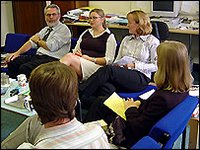 We live in the ‘New-Age of compliance’. Apparently, we have an unbounded tendency to disciminate against those who are younger or older than ourselves (that's everyone born before and after you, namely everyone). As we are all guilty until proven innocent, we will ALL be subjected to the mass, collective punishment of tortuous ager-compliance training.
We live in the ‘New-Age of compliance’. Apparently, we have an unbounded tendency to disciminate against those who are younger or older than ourselves (that's everyone born before and after you, namely everyone). As we are all guilty until proven innocent, we will ALL be subjected to the mass, collective punishment of tortuous ager-compliance training. This is likely to be a curious mixture of over-detailed descriptions of the legislation, (The Employment Equality (Age) Regulations 2006 - SI No 2006/1031), crude scenarios that are never likely to happen in real life, mnemonics such as CRAP (Consider Recruitment on Age Prisonable) and questions such as,
Gillian calls Donald a “filthy, old, baldy, Scottish four-eyes”. Donald replies, “fair cop”! Is she contravening the:
a. Sex Discrimination Act, 1975
b. Race Relations Act, 1976
c. Disability Discrimination Act, 1995
d. Employment Equality (Age) Regulations 2006
e. All of the above
Employers, frightened by the new legislation, will spend untold sums of money hiring consultants, being audited, discussing, worrying, changing websites, reprinting documentation, altering recruitment procedures and, of course, delivering dull training around the New-Age legislation.
Of course, training itself becomes suspect.
Any training programme with ‘age-sensitive’ content becomes dangerous. I can think of dozens of examples where profiles of fictional people in scenarios, not only mention age, but are explicit about age-related issues. Curiously, in an attempt to be sympathetic to either youth or experience, they are often explicit about age, inadvertently breaking the law.
Your recruitment training (online and offline) is likely to have age-sensitive references and recommendations – they need to be changed.
Graduate training schemes are now suspect. They can be seen as discriminating on the grounds of age.
Coaching and mentoring training can no longer mention the advantages of being coached by someone older.
Profiles with ages mentioned on online discussion software needs to be amended.
Blended learning favouring a different approach for younger or older learners will not be tolerated. In IT training, age will be no defence. You will deliver the same training in the same way without fear or favour to anyone.
Above all, we’re likely to have another huge batch of dull training (classroom and e-learning) which will produce a soporific in learners, turning them off learning and painting the training department into a boring ghetto of compliance.








